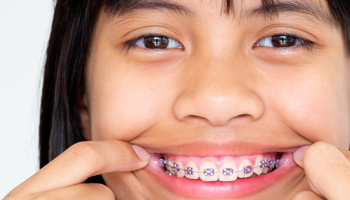
Each February, the American Dental Association (ADA) sponsors National Children's Dental Health Month to raise awareness about the important role oral health plays in keeping kids happy and healthy. Research continues to show the impact that oral health can have on your overall health and developing healthy habits early in life can make a difference! This month, we celebrate all the parents, teachers, caregivers and dental teams who work hard to put kids on the path to a healthy future.
Healthy Habits Start Early
The centerpiece of good oral health is preventative care. This includes eating healthy, brushing and flossing daily, and making time for regular visits to the dentist. Developing these healthy habits early will put your child on track to a lifetime of healthy, confident smiles.
Visit the Dentist

The ADA recommends that the first dental visit take place within six months after the first tooth appears, but no later than a child’s first birthday. Your dentist and hygienist will talk to your child about good oral health and answer any questions you may have.
Eat Healthy
A well-rounded healthy diet includes plenty of fruits and vegetables, lean protein, and whole grains. Eating food of different colors is a great way to encourage children: Blueberries, orange carrots, yellow squash, green beans and red apples. Encourage your kids to enjoy treats in moderation and avoid sugary foods, juices and candy, especially sticky gummy candies, gummy vitamins and fruit “roll-ups”, which can erode tooth enamel and cause cavities. If you eat these treats, make sure to rinse your mouth or brush your teeth immediately after.
Brush & Floss

Start soon after birth by gently wiping your child’s gums daily with gauze or a soft washcloth. As soon as a first tooth comes in, you can add a soft-bristled toothbrush. Caregivers should brush the child’s teeth until they are old enough to do a good job on their own. Use a small amount of an ADA-accepted fluoride toothpaste and make sure your child does not swallow it. Flossing should begin when any two teeth touch. Model good behavior and let your child watch YOU care for your teeth.
Beware of Sports Drinks
Sports Drinks sound healthy, but are they? Most drinks advertise they help with hydration but usually contain high levels of sugar and acids, which can erode tooth enamel and lead to cavities. Make sure your kids know that the best hydration is fresh water! If your child does drink sports drinks, in moderation, here are some tips to minimize the impact:
 Swallow immediately and do not hold the sports drink in the month
Swallow immediately and do not hold the sports drink in the month Alternate with sips of water to rinse the mouth.
Do not rinse mouthguards in sports drinks.
Do your research and substitute dental friendly sports drinks
What About Braces?
 Straight teeth do more than give you a great smile. They help with your health and wellbeing. Believe it or not, dentists can recognize bad bites as early as 2-3 years of age. Often, early steps can be taken to reduce the need for major orthodontic treatment at a later age. When kids are 2-6 years old, dentists look at how the teeth are coming in and consider harmful habits such as finger or thumb sucking. The American Association of Orthodontists (AAO) recommend that children have a consultation with the orthodontist by age 7. Today, there are so many options from traditional braces with fun colors and decorated cases to teen Invisalign and clear, plastic aligners. Your Orthodontist will work up a treatment plan just for you.
Straight teeth do more than give you a great smile. They help with your health and wellbeing. Believe it or not, dentists can recognize bad bites as early as 2-3 years of age. Often, early steps can be taken to reduce the need for major orthodontic treatment at a later age. When kids are 2-6 years old, dentists look at how the teeth are coming in and consider harmful habits such as finger or thumb sucking. The American Association of Orthodontists (AAO) recommend that children have a consultation with the orthodontist by age 7. Today, there are so many options from traditional braces with fun colors and decorated cases to teen Invisalign and clear, plastic aligners. Your Orthodontist will work up a treatment plan just for you.
Sealants Make Sense
Protect your child’s teeth from cavities with sealants. Sealants are thin, plastic coatings painted on the chewing surfaces of the back teeth. They quickly harden to form a powerful shield that prevents tooth decay, and can last for up to 10 years. Children should get sealants on their permanent molars as soon as teeth come in. It’s a simple and painless process that takes place in the dental office. School-age children without sealants have almost 3x more cavities than children with sealants according to the ADA. Ask your dentist about sealants at your next visit!
